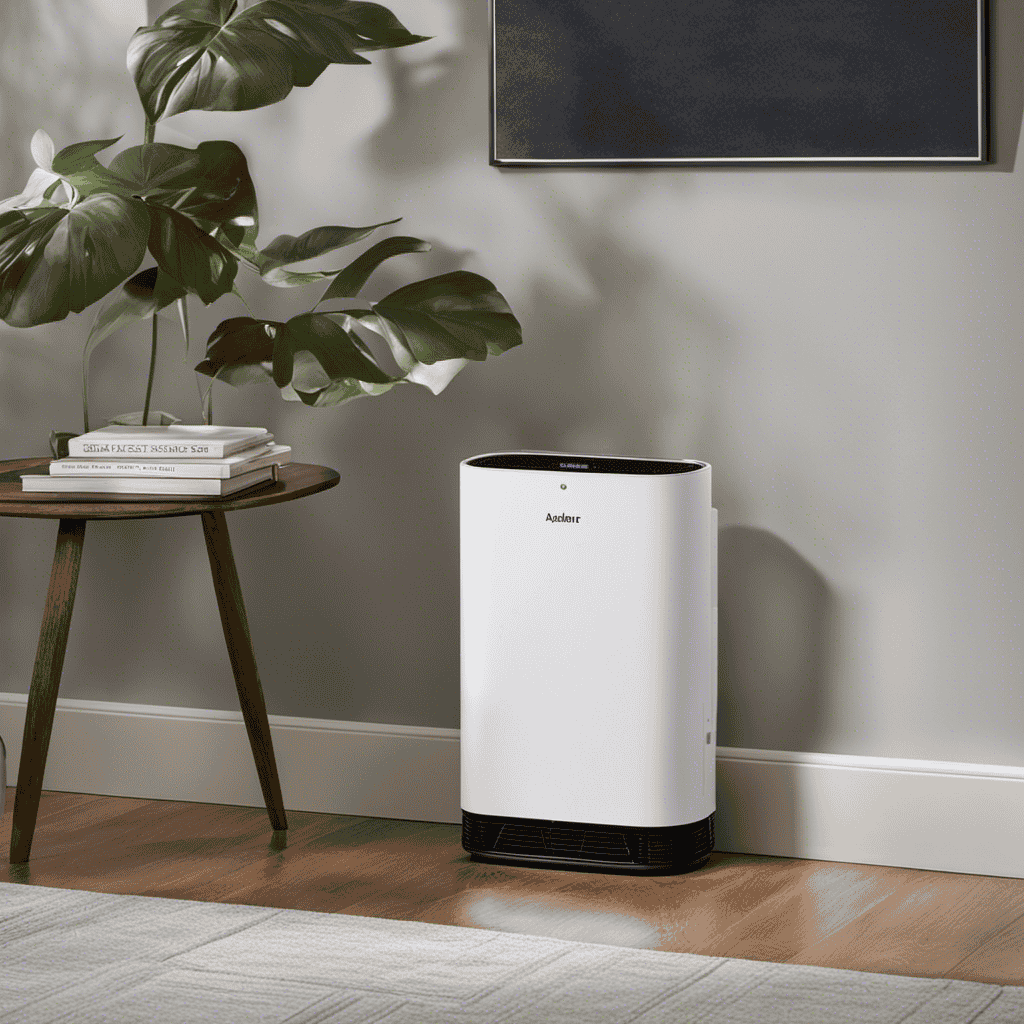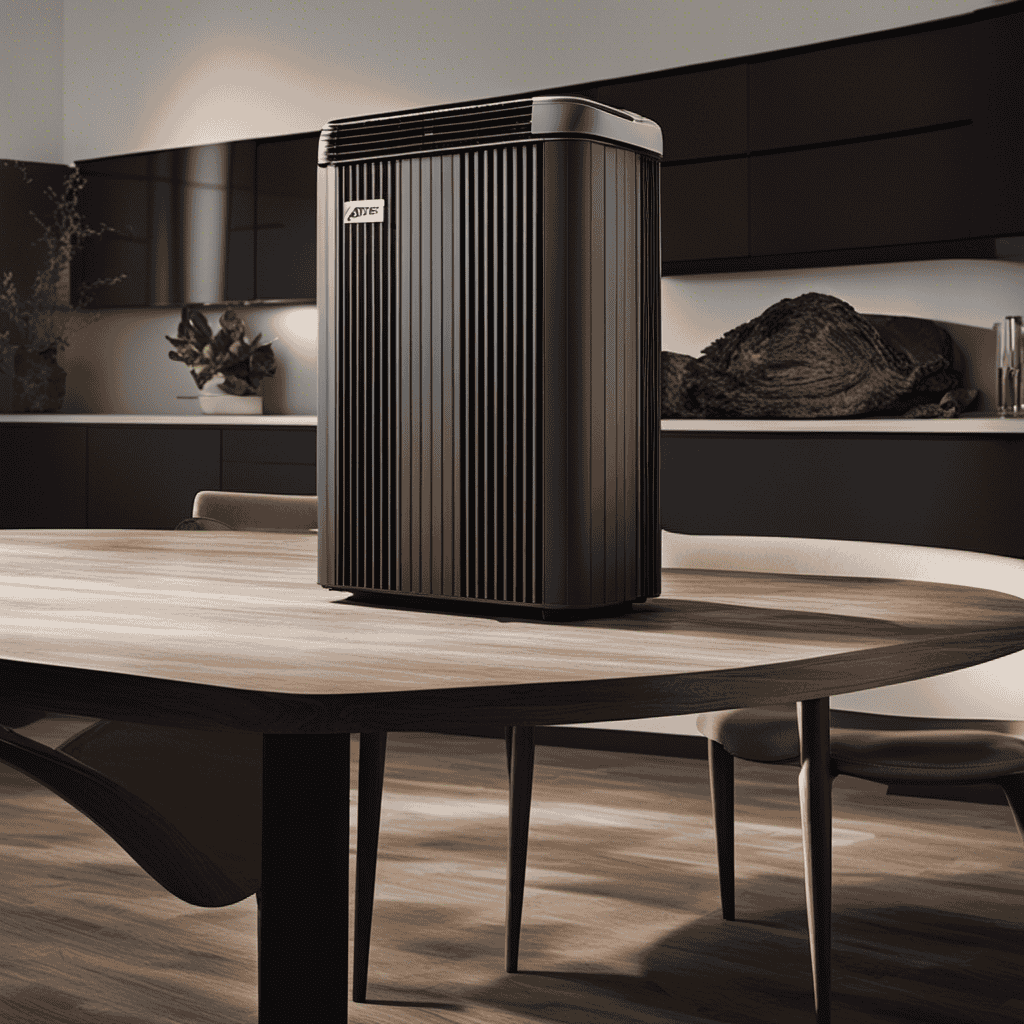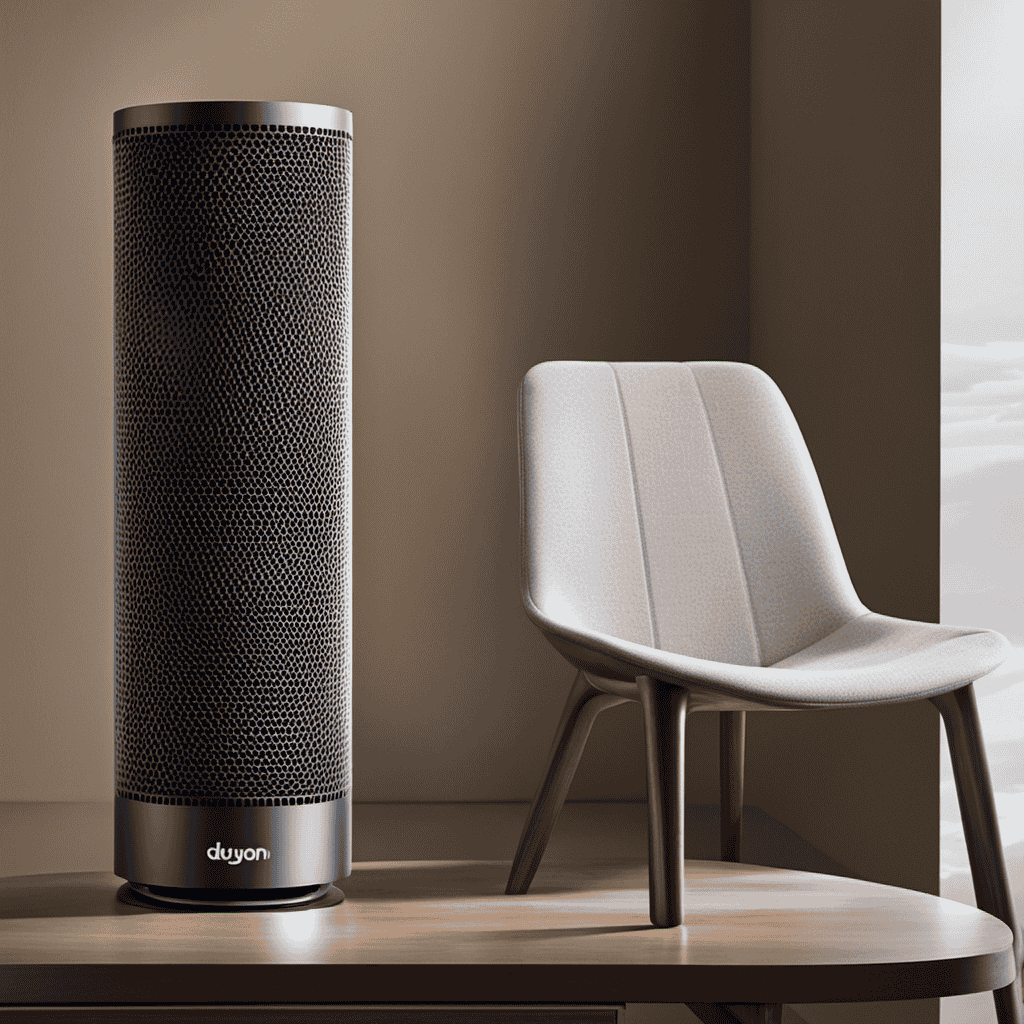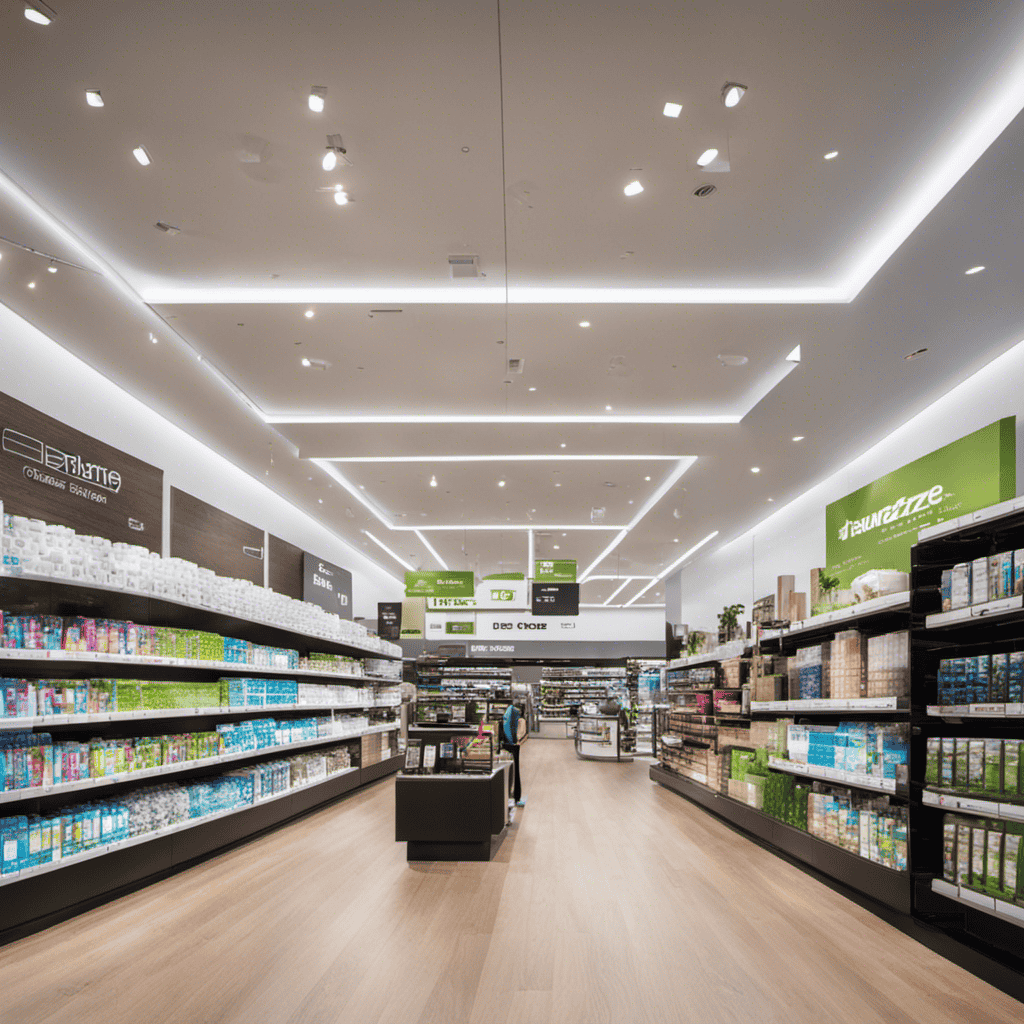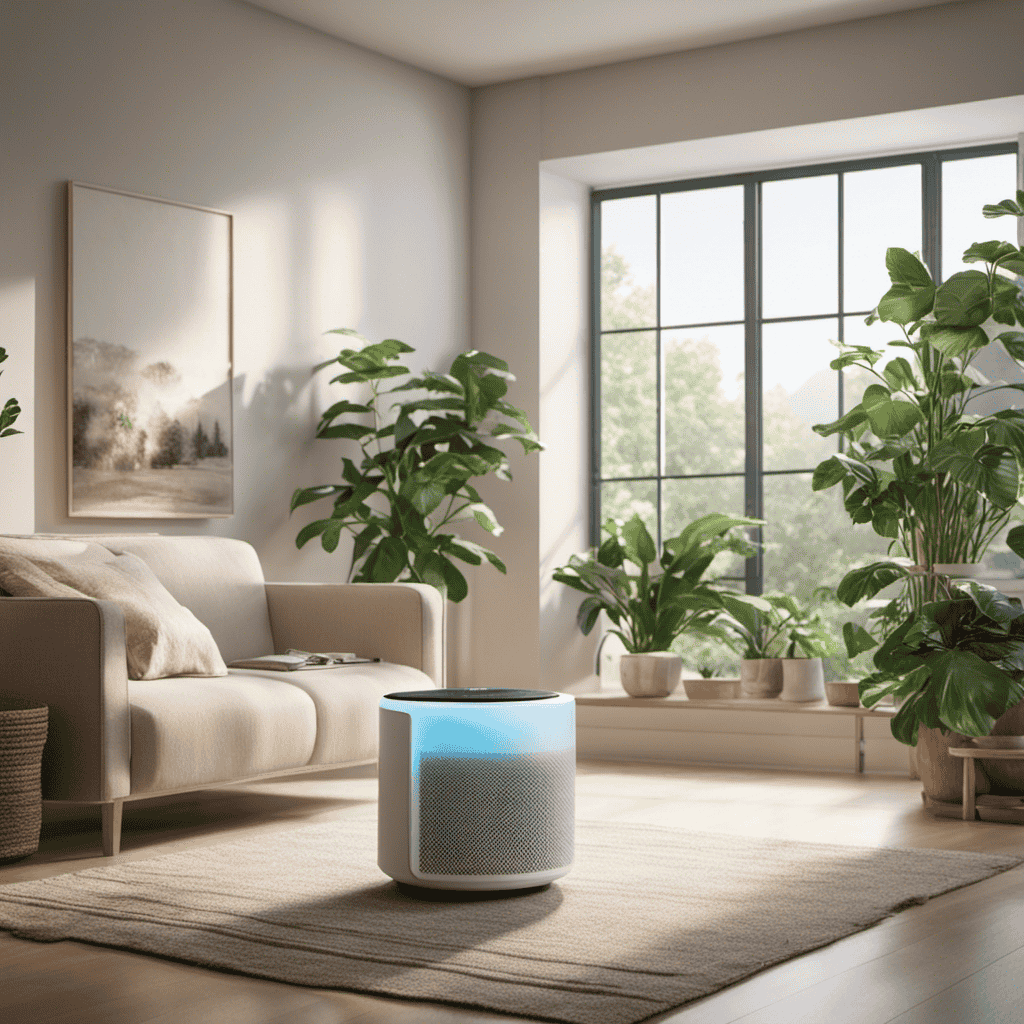Being the owner of an air purifier, I understand the significance of routinely servicing my filter. It feels as though I’m providing my lungs with a gulp of clean air.
Understanding how often to change the filter is crucial to ensure optimal performance and clean air in my home.
In this article, I’ll delve into the factors that determine filter replacement frequency and provide tips on extending its lifespan.
So, let’s dive in and discover the best practices for keeping our air purifiers running smoothly.
Key Takeaways
- Regular filter maintenance is crucial for optimal performance and effectiveness of air purifiers.
- Filters should be replaced every few months to maintain clean air quality and improve respiratory function.
- Factors such as usage, environment, and filter quality determine the frequency of filter replacement.
- Decreased air flow and increased dust accumulation are signs that the air purifier filter needs to be changed.
The Importance of Regular Filter Maintenance
Regular filter maintenance is crucial for ensuring optimal performance of your air purifier. By following these air purifier maintenance tips, you can enjoy the benefits of clean air in your home or office.
Clean filters help to remove harmful particles such as dust, pollen, pet dander, and smoke, improving the overall air quality. Not only does this promote a healthier environment, but it can also alleviate symptoms of allergies and respiratory issues.
Regularly cleaning or replacing your filters prevents the build-up of these particles, allowing your air purifier to work efficiently. Understanding the lifespan of air purifier filters is important in maintaining their effectiveness.
I will now explain how often you should change your air purifier filters to ensure the best air quality in your space.
Understanding the Lifespan of Air Purifier Filters
Typically, you’ll want to replace the filters in your air purifier every few months to ensure optimal performance. Understanding filter performance is crucial for maintaining clean air in your home. Here are four key points to consider:
-
Efficiency: Air purifier filters are designed to capture and remove airborne particles, such as dust, pollen, and pet dander. Over time, these filters can become clogged, reducing their efficiency and effectiveness.
-
Air Quality: Regularly replacing your air purifier filters helps to maintain clean air quality by removing harmful pollutants and allergens. This can lead to significant health benefits, such as reduced allergy symptoms and improved respiratory function.
-
Longevity: Clean air filters not only improve air quality but also prolong the lifespan of your air purifier. By preventing the buildup of debris, the motor and other components can operate more efficiently, extending the overall life of the appliance.
-
Energy Efficiency: When air filters are clogged, the air purifier has to work harder to circulate air, leading to increased energy consumption. By regularly replacing filters, you can ensure your air purifier operates at peak efficiency, saving energy and reducing costs.
Understanding the importance of clean air and the benefits of replacing air purifier filters regularly is essential. However, several factors determine the frequency of filter replacement.
Factors That Determine Filter Replacement Frequency
When it comes to determining the frequency of filter replacement for air purifiers, there are several key factors that play a crucial role.
Firstly, the usage and environment impact should be taken into consideration. Factors such as the size of the room, the number of people present, and the level of pollution in the area can all affect the lifespan of the filter.
Secondly, the quality of the filter itself is an important factor. High-quality filters are designed to capture a higher percentage of airborne particles, resulting in a longer lifespan.
Lastly, the efficiency of the filter in removing pollutants from the air also affects its lifespan. Filters with higher efficiency ratings are more effective at capturing and trapping pollutants, which can prolong their lifespan.
Usage and Environment Impact
To ensure optimal performance and minimize environmental impact, you should consider the frequency of filter changes based on your usage and the air quality in your home. Maintaining your air purifier is crucial for its effectiveness and longevity. Here are some air purifier maintenance tips to help you make informed decisions:
-
Follow the manufacturer’s guidelines: Every air purifier has specific recommendations for filter replacement. It’s essential to adhere to these guidelines to ensure the device functions efficiently.
-
Monitor air quality: Keep track of the air quality in your home using an air quality monitor. If you have pets, smoke, or live in an area with high pollution levels, you may need to change the filter more frequently.
-
Check the filter regularly: Inspect the filter regularly to see if it’s clogged or dirty. A dirty filter can reduce the air purifier’s performance and strain the motor.
-
Consider filter type: Different filters have different lifespans. HEPA filters typically last longer, but carbon filters may need more frequent replacement. Be aware of the filter type your air purifier uses and plan accordingly.
Filter Quality and Efficiency
The lifespan of different filters varies depending on their quality and efficiency. It is important to understand the factors that contribute to the longevity of filters in order to ensure optimal performance of air purifiers.
Regular filter maintenance is crucial for maintaining clean and healthy indoor air. Here are some filter maintenance tips that can help prolong the lifespan of your filters:
- Check the manufacturer’s recommendations for filter replacement intervals.
- Vacuum or clean the filters regularly to remove dust and debris.
- Replace the filters when they become visibly dirty or clogged.
By following these tips, you can ensure that your air purifier continues to provide the benefits of clean air for a longer period of time.
Clean air is essential for our health and well-being, and proper filter maintenance plays a vital role in achieving and maintaining it.
Signs That Your Air Purifier Filter Needs to Be Changed
Check if you’re experiencing decreased air flow or increased dust accumulation, as these could be signs that your air purifier filter needs changing. It’s important to recognize these warning signs to ensure that your air purifier continues to function effectively.
Many people make common mistakes when it comes to maintaining their air purifier filters, such as neglecting to change them regularly or not following the manufacturer’s recommendations. To help you avoid these mistakes, here are four important things to keep in mind:
-
Regularly check the air flow: If you notice a decrease in air flow, it could be a sign that your filter is clogged and needs to be replaced.
-
Monitor dust accumulation: An increase in dust accumulation on surfaces can indicate that your filter is no longer able to effectively capture airborne particles.
-
Follow the manufacturer’s guidelines: Each air purifier has different filter replacement recommendations, so make sure to follow the instructions provided by the manufacturer to ensure optimal performance.
-
Keep track of usage time: Some filters have a recommended lifespan, which is typically measured in months or hours of usage. Keep track of how long your filter has been in use and replace it accordingly.
How to Extend the Life of Your Air Purifier Filter
If you want to extend the life of your air purifier filter, remember to regularly clean the surrounding area to prevent dust and debris from accumulating. This will help ensure that your air purifier is able to effectively filter the air in your home or office. In addition to cleaning the surrounding area, there are a few other ways to clean air filters and address common filter problems. One common issue with air filters is that they can become clogged with dirt and dust over time. To clean a clogged air filter, you can gently vacuum the filter or use compressed air to blow out the debris. Another common problem is that air filters can become damaged or worn out. In this case, it is important to replace the filter with a new one to maintain the effectiveness of your air purifier.
| Ways to Clean Air Filters | Common Filter Problems |
|---|---|
| Vacuum the filter | Clogged filter |
| Use compressed air | Damaged or worn out |
| Replace with new filter |
Recommended Filter Replacement Schedule for Different Environments
To ensure optimal performance, it’s important to regularly replace your air purifier filter based on the recommended schedule for your specific environment. Different air purifier brands have their own recommendations, so it’s important to check the user manual or manufacturer’s website for the specific guidelines.
Here are some general guidelines to help you determine when to replace your air purifier filter:
-
Check the filter indicator: Many air purifiers have a filter indicator that alerts you when it’s time to replace the filter. This indicator is usually based on the amount of usage or the level of air pollution in your environment.
-
Evaluate air quality: If you notice a decrease in air quality or an increase in allergies or respiratory issues, it may be time to replace the filter. This is especially important in high-pollution areas or homes with pets.
-
Follow the manufacturer’s recommendations: Each air purifier brand may have different recommendations for filter replacement based on the type of filter and the specific model. Following these recommendations will ensure that your air purifier continues to effectively remove pollutants from the air.
-
Consider cost-effective filters: Some air purifier brands offer cost-effective filters that can be replaced more frequently without breaking the bank. These filters may have a shorter lifespan but can still provide effective air purification at a lower cost.
Tips for Properly Changing the Filter on Your Air Purifier
As an expert in air purification systems, I understand the importance of maintaining clean air in our indoor environments.
One key factor in achieving this is ensuring the proper frequency of filter replacement. Regularly changing the filters in your air purifier is crucial to maintaining its efficiency and effectiveness in removing pollutants and allergens from the air.
Filter Replacement Frequency
You should regularly check and change the filter on your air purifier to maintain its efficiency. The frequency of filter replacement depends on several factors such as the type of filter, the air quality in your area, and the usage of the air purifier.
Here are some general guidelines to help you determine when to replace your air purifier filter:
-
Manufacturer’s recommendations: Follow the guidelines provided by the manufacturer of your air purifier. They will usually specify how often the filter should be replaced.
-
Indoor air quality: If you live in an area with high levels of pollutants or if you have pets or smokers in your home, you may need to replace the filter more frequently.
-
Filter type: Different types of filters have different lifespans. HEPA filters, for example, typically last around 6 to 12 months, while carbon filters may need to be replaced more often.
-
Usage: If you run your air purifier for extended periods or on high settings, the filter may clog faster and require more frequent replacement.
Regularly replacing the filter in your air purifier will ensure that it continues to effectively remove airborne particles and provide you with the benefits of clean air.
Importance of Clean Air
Air pollution is a serious issue that affects our health and environment. Breathing clean air is essential for our well-being, as it provides numerous benefits. Clean air reduces the risk of respiratory problems, allergies, and asthma. It also improves cardiovascular health and enhances cognitive function. On the other hand, exposure to air pollution can have detrimental effects on our bodies. It can lead to respiratory illnesses, heart disease, and even cancer. Moreover, air pollution also harms the environment, causing damage to ecosystems and contributing to climate change. To understand the importance of clean air, let’s take a look at the table below, which highlights the benefits of breathing clean air and the effects of air pollution.
| Clean Air Benefits | Air Pollution Effects |
|---|---|
| Reduces health risks | Increases respiratory illnesses |
| Enhances cognitive function | Causes cardiovascular problems |
| Improves cardiovascular health | Contributes to climate change |
| Reduces allergies and asthma | Harms ecosystems |
Breathing clean air is crucial for our overall well-being and the preservation of our environment.
Frequently Asked Questions
Can I Clean My Air Purifier Filter Instead of Replacing It?
I clean my air purifier filter instead of replacing it to save money. However, cleaning only removes surface dirt and reduces its effectiveness. Replacing the filter regularly ensures optimal air purification and avoids health risks.
What Happens if I Don’t Replace My Air Purifier Filter Regularly?
Neglecting to replace the air purifier filter regularly can compromise the health benefits it provides. It hampers air quality improvement and allows pollutants to circulate, leading to potential respiratory issues.
Are There Any Health Risks Associated With Not Changing the Air Purifier Filter?
Not changing the air purifier filter regularly can lead to health risks. It is crucial to understand the air purifier filter lifespan and the importance of regular filter changes for maintaining clean and healthy air.
How Do I Know if My Air Purifier Filter Is Working Properly?
To ensure my air purifier filter is working properly, I check for signs of a dirty filter, like decreased airflow or a musty smell. Cleaning the filter regularly is essential for optimal performance and to maintain clean air in my home.
Can I Use a Different Brand of Filter for My Air Purifier?
I can use a different brand of filter for my air purifier, but there may be compatibility issues. It’s important to check the manufacturer’s recommendations to ensure proper functioning and filtration effectiveness.
Conclusion
In conclusion, maintaining a regular filter replacement schedule is crucial for the optimal performance of your air purifier. According to a study conducted by the Environmental Protection Agency, indoor air can be up to five times more polluted than outdoor air.
This statistic highlights the importance of regularly changing the filter to ensure clean and healthy air in your living space. By following the recommended filter replacement schedule and implementing proper maintenance techniques, you can extend the life of your air purifier and enjoy the benefits of cleaner air.
